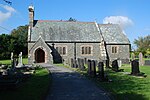St Edern's Church, Bodedern (sometimes referred to as St Edeyrn's Church) is a medieval parish church in the village of Bodedern, in Anglesey, north Wales. Although St Edern established a church in the area in the 6th century, the oldest parts of the present building date from the 14th century. Subsequent alterations include the addition of some windows in the 15th century, and a chancel, transept and porch in the 19th century, when the nave walls were largely rebuilt. Stained glass was also inserted into the windows of the chancel and transept.
The church contains a 6th-century inscribed stone found near the village, a medieval font, and some 17th-century decorated wooden panels from Jesus College, Oxford, which was formerly connected with the church. St Edern's also owns three pieces of 19th-century church silverware, but a silver chalice dated 1574 was lost some time during the 19th century. An 18th-century gallery at the west end rests on two oak crossbeams, one of which was previously used to support the rood loft.
The church is still used for worship by the Church in Wales, one of nine in a combined parish, but as of 2013 there has not been a vicar in the parish since September 2009. It is a Grade II* listed building, a national designation given to "particularly important buildings of more than special interest", in particular because it is regarded as "a good example of a late medieval church, its character maintained in the late 19th-century restoration and rebuilding work, and retaining some of the medieval fabric and windows."








